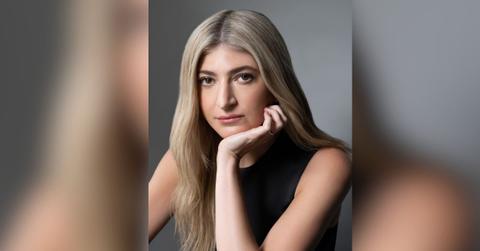
Sarah Hoover shared why she wrote 'The Motherload.'
Sarah Hoover Wrote 'The Motherload' After Suffering 'a Very Long Postpartum Depression': 'I've Never Felt More Like Myself'
When Sarah Hoover wrote The Motherload, she wasn’t trying to be brave. She was trying to survive. What began as private journaling during a long battle with postpartum depression evolved into a searingly honest memoir, one that has resonated with readers and earned praise from Oprah Daily, who called it a "long overdue reality check."
"After the birth of my son, who's seven years old now, I suffered a very long postpartum depression," Hoover recalled. "I remember feeling so lonely and isolated, and I tried to find a book or an article online or anything I could that would make me feel like I wasn't the first person to have this experience. And I couldn't really find anything that spoke to me."
A respected figure in the art world, Hoover pivoted to writing during the pandemic, drawing from years of journal entries. "I started trying to turn it into an essay, and before I knew it, I had a hundred thousand words," she said. What followed was a raw, unfiltered account of a struggle many women experience but few publicly discuss.
"I made the decision when I sold my book that I was really going to commit to a certain level of honesty," Hoover said. "Whenever I said the unsayable thing, the lighter I felt, the happier I felt, the more connected to other people I felt."
Born in Indiana and educated at Columbia and NYU, Hoover built her career at the intersection of art and culture, working for prestigious galleries and co-founding ABT's Accelerator Committee to support female choreographic initiatives. Her deep ties to ballet stem from her early training under legendary Russian ballerina Irina Kolpakova, whose impact still shapes Hoover's devotion to the dance world today.
"Ballet taught me about classical music. It taught me about my body. It taught me about this beautiful art form, which I consider to be the pinnacle of human expression," Hoover explained. "There's a barrier to entry to ballet in many ways, and it's expensive for most people, but it was invaluable to me."
That commitment is part of why she is being honored at the Youth America Grand Prix (YAGP) Gala on April 29. "YAGP is this massive scholarship program. Something like 70% of ABT dancers went through YAGP," she noted. Her involvement highlights a lifelong belief that supporting young artists is essential to keeping the art form alive.
Writing The Motherload forced Hoover to confront not only the expectations society places on women but also the ones she placed on herself. "I spent the vast majority of my life trying to be as polite and as good and well-behaved as possible," she admitted. "And yet I found myself broken and wanting to die."
What makes Hoover's voice distinct is her fearless critique of cultural narratives. "There's huge societal pressure for women to fit into a very narrow definition of what it means to be a good girl," she said. "If this isn't the way it turns out for you, you're a bad woman. It's heartbreaking."
Hoover’s willingness to voice the messy realities of motherhood, identity, and mental health has struck a powerful chord. "I've had women in their seventies come up to me at some of my book events and say, 'After reading your book, I realized that I've had postpartum depression since I had my kids 50 years ago,'" she shared.
Her background in art history, she says, shaped the critical lens through which she views the world. "Art history teaches you criticality and questioning systems and power structures," Hoover explained. "For the first time, I took that knowledge outside of an academic context and tried to apply it to the real world."
The transition from the art world to memoir writing wasn’t seamless. "I'd never written memoir. I'd never taken a creative writing class at a college level," she said. Yet writing unlocked something deeply fulfilling. "I felt like a part of my brain lit up that I didn't feel doing anything else. This is the happiest I've ever been."
Though Hoover grapples with "massive imposter syndrome," she finds peace in her work. "I've never felt more like myself and my true self than when I'm sitting in bed with no pants on writing," she joked.
As she looks ahead, Hoover plans to write fiction next. "The bug has bitten me now," she said. Her goal is simple: "Meet interesting, smart people who are passionate and work with them."
At her core, Sarah Hoover remains an advocate—for women, for artists, for honesty. And whether through dance, writing, or activism, her message is clear: the most radical thing you can do is tell the truth.
